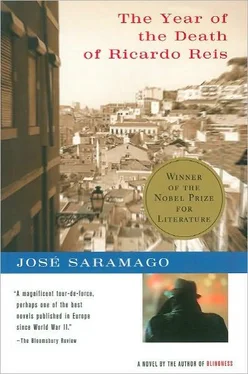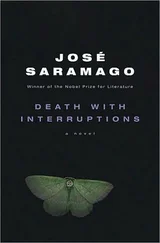José Saramago - Year of the Death of Ricardo Reis
Здесь есть возможность читать онлайн «José Saramago - Year of the Death of Ricardo Reis» весь текст электронной книги совершенно бесплатно (целиком полную версию без сокращений). В некоторых случаях можно слушать аудио, скачать через торрент в формате fb2 и присутствует краткое содержание. Год выпуска: 1992, ISBN: 1992, Издательство: Houghton Mifflin Harcourt, Жанр: Современная проза, на английском языке. Описание произведения, (предисловие) а так же отзывы посетителей доступны на портале библиотеки ЛибКат.
- Название:Year of the Death of Ricardo Reis
- Автор:
- Издательство:Houghton Mifflin Harcourt
- Жанр:
- Год:1992
- ISBN:9780547546926
- Рейтинг книги:4 / 5. Голосов: 1
-
Избранное:Добавить в избранное
- Отзывы:
-
Ваша оценка:
- 80
- 1
- 2
- 3
- 4
- 5
Year of the Death of Ricardo Reis: краткое содержание, описание и аннотация
Предлагаем к чтению аннотацию, описание, краткое содержание или предисловие (зависит от того, что написал сам автор книги «Year of the Death of Ricardo Reis»). Если вы не нашли необходимую информацию о книге — напишите в комментариях, мы постараемся отыскать её.
Year of the Death of Ricardo Reis — читать онлайн бесплатно полную книгу (весь текст) целиком
Ниже представлен текст книги, разбитый по страницам. Система сохранения места последней прочитанной страницы, позволяет с удобством читать онлайн бесплатно книгу «Year of the Death of Ricardo Reis», без необходимости каждый раз заново искать на чём Вы остановились. Поставьте закладку, и сможете в любой момент перейти на страницу, на которой закончили чтение.
Интервал:
Закладка:
The sun goes down but the heat does not abate. In the immense square there does not appear to be room for a pin, yet the crowd continues to mill around the periphery, there is a steady, constant stream of people, on this side they are still trying to get better vantage points, they must be doing the same over there. Ricardo Reis, strolling in the immediate vicinity, suddenly becomes aware of another pilgrimage, that of beggars. He sees true beggars and false beggars, and the difference is important, a true beggar is simply a poor man who begs, while your false beggar has turned begging into a profession, it is not unknown for people to become rich this way. Both use the same techniques, the whimpering, the pleading with outstretched hand, or sometimes two hands, a theatrical tour de force which is difficult to resist, Alms for the sake of the souls of your dear departed, God will reward you, Have pity on a poor blind man, have pity on a poor blind man, and some display an ulcerated leg, an amputated arm, but not what we are searching for. It is as if the gates of hell have been opened, for only from hell could such horrors have come. And now it is the turn of those selling lottery tickets, they make such an uproar as they call out winning numbers that prayers are arrested in midflight to heaven. A man interrupts his paternoster because he has a sudden hunch about the number three thousand six hundred and ninety-four. Clutching his rosary in a distracted hand, he fondles the ticket as if weighing its potential, then shakes from his handkerchief the necessary number of escudos and resumes his prayer where he broke off, Give us this day OUT daily bread , words now recited with greater hope. An attack is now launched by vendors of blankets, ties, handkerchiefs, and baskets, and by the unemployed, who wear armbands and sell holy pictures. They are not really selling, first they receive alms, then they hand over the picture, it is one way of maintaining their dignity. This poor wretch is neither a true beggar nor a false beggar, he asks for alms only because he is out of work. Now here is an excellent idea, let all the unemployed wear armbands, strips of black cloth bearing bold white letters for all the world to see, Unemployed, it would make the counting of them easier and ensure that we do not forget them. But worst of all, because they upset our spiritual peace and disturb the tranquillity of this holy place, are the hordes of hawkers. Let Ricardo Reis steer clear, otherwise they will pounce on him at once with that infernal shouting, Look, it's a bargain, Look, this has been blessed, the image of Our Blessed Lady painted on trays and statues, bunches of rosaries, crucifixes by the dozen, tiny medals, Sacred Hearts of Jesus and Ardent Hearts of Mary and three little shepherds with their hands joined in prayer and kneeling on the ground. One shepherd is a boy, but there is no evidence in either the hagiographical reports or the process of beatification that he ever lifted the skirts of little girls. The entire merchant confraternity cries out as if possessed, Woe to the trading Judas who tries with sly blandishments to steal a fellow trader's customer, whereupon the veil of the temple is torn and curses and insults rain down on the head of the treacherous rogue. Not even in Brazil can Ricardo Reis recall ever having heard such fiery rhetoric, clearly this branch of oratory has made considerable progress.
The precious gem of Catholicism sparkles with many facets, the facet of suffering for which there remains no hope other than that of returning each year, the facet of faith which in this holy place is sublime and fertile, the facet of common charity, the facet of Bovril, the facet of trading in scapulars and the like, the facet of trinkets and baubles, of printing and weaving, of eating and drinking, of lost and found, searching and finding. Ricardo Reis continues searching, but will he find. He has been to the hospital, he has explored the tents, he has gone through the open-air market in every direction, now he descends into the bustling esplanade, plunges into the dense multitude, sees their spiritual exercises, their acts of faith, their pitiful prayers, the vows they fulfill by crawling on all fours with bleeding knees, sees hands supporting a penitent woman under the armpits before she faints from pain and unbearable ecstasy, and the sick who have been brought from the hospital, their stretchers set out in rows. Between those rows the statue of Our Blessed Lady the Holy Virgin will be carried on a litter adorned with white flowers. Ricardo Reis lets his eyes wander from face to face, they search but do not find, as if he were in a dream that has no meaning, like the dream of a road that goes nowhere, of a shadow cast by no object, of a word which the air has uttered and then denied. The hymns are primitive, sol and do, sol and do, the choir is one of quavering shrill voices that constantly break off and start again. On the thirteenth of May in the Cova da Iria there is suddenly a great silence, the statue is about to make its exit from the Chapel of the Apparitions. A shudder goes through the crowd, the supernatural has come and blown over two hundred thousand heads, something is bound to happen. Gripped by mystical fervor, the sick hold out handkerchiefs, rosaries, medals, the priests take them, touch the statue with them, and return them to the supplicants, while the poor wretches implore, Our Lady of Fatima give me life, Our Lady of Fatima grant me the miracle of walking, Our Lady of Fatima help me to see, Our Lady of Fatima help me to hear, Our Lady of Fatima give me back my health, Our Lady of Fatima, Our Lady of Fatima, Our Lady of Fatima. The dumb do not plead, they simply look on, if they still have eyes to see with. However hard Ricardo Reis strains, he does not hear, Our Lady of Fatima look upon this left arm of mine and cure me if you can. Thou shalt not tempt the Lord Thy God or His Holy Mother, and if you think it over carefully you will realize that one should not ask for anything, instead one should resign oneself, that is what humility demands, because only God knows what is good for us.
The statue was brought out, carried around in procession, then it disappeared. The blind still could not see, the dumb still could not speak, the paralyzed still were paralyzed, missing limbs did not grow back, and the pains of the afflicted were not diminished. Weeping bitter tears, they accused and blamed themselves, My faith was lacking, mea culpa, mea culpa, mea maxima culpa. Prepared to concede a few miracles, the Virgin had left her chapel, but she found the faithful wavering, No burning bushes here, no everlasting oil lamps, this will not do, let them come back next year. The evening shadows lengthen as twilight approaches, it too at a processional pace. Little by little the sky loses the vivid blue of day, turns pearl, but over there the sun, hidden behind the trees on distant hills, explodes into crimson, orange, red, more volcano than sun, it seems incredible that this should happen in silence. Soon night will fall, campfires are lit, the vendors have stopped shouting, the beggars are counting their coins, beneath trees bodies are being nourished, knapsacks are opened, people munch stale bread, raise the cask or wineskin to their parched lips, all eat, but the food varies according to their means.
Ricardo Reis found shelter with a group of pilgrims sharing a tent. There was no discussion, they saw him standing there with a lost look on his face, a suitcase in his hand, a blanket he had bought rolled up under his arm. He in turn saw that the tent would do him nicely as long as the night did not become too cold. They told him, Make yourself comfortable. He started to say, No, thanks just the same, but they insisted, Look, our offer comes from the heart, and it was true, he realized, and joined the large group from Abrantes. This snuffling, which can be heard throughout the Cova da Iria, comes as much from chewing as from praying, because while some seek solace for their tormented souls, others satisfy the pangs of hunger, or alternate between the two. By the dying light of the campfires Ricardo Reis does not find Marcenda, nor. will he see her later on during the procession of candles, nor in his sleep, when he is overcome with exhaustion, frustration, the desire to disappear from the face of the earth. He sees himself as two people, the dignified Ricardo Reis who each day washes and shaves, and this other Ricardo Reis, a vagrant with a stubble, crumpled clothes, creased shirt, hat stained with sweat, shoes covered with dust. The first asks the second to explain, please, why he has come to Fatima without any faith, with only a wild dream, And if you do see Marcenda, what will you say to her, can you imagine how absurd you would look if she appeared before you now at her father's side, or, worse still, alone, take a good look at yourself, do you really believe that a girl, even one with only one arm, would fall madly in love with a ridiculous middle-aged doctor. Ricardo Reis humbly accepts this criticism and, deeply ashamed that he is in such shabby and filthy condition, pulls the blanket over his head and goes back to sleep. Nearby, someone is snoring without a care in the world, and behind that sturdy olive tree there is murmuring that cannot be mistaken for prayers, chuckling that scarcely suggests a choir of angels, sighs that are not provoked by spiritual ecstasy. Dawn is breaking, some early risers stretch their arms and get up to poke the fire, a new day is beginning, posing fresh trials to those who seek the fruits of paradise.
Читать дальшеИнтервал:
Закладка:
Похожие книги на «Year of the Death of Ricardo Reis»
Представляем Вашему вниманию похожие книги на «Year of the Death of Ricardo Reis» списком для выбора. Мы отобрали схожую по названию и смыслу литературу в надежде предоставить читателям больше вариантов отыскать новые, интересные, ещё непрочитанные произведения.
Обсуждение, отзывы о книге «Year of the Death of Ricardo Reis» и просто собственные мнения читателей. Оставьте ваши комментарии, напишите, что Вы думаете о произведении, его смысле или главных героях. Укажите что конкретно понравилось, а что нет, и почему Вы так считаете.












